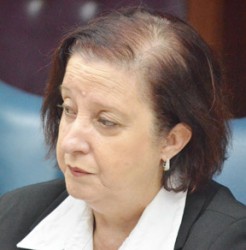Talks between government and the United States (US) on the USAID-funded Leadership and Democracy (LEAD) project are set to begin next week.
The Donald Ramotar administration had up to recently insisted that the $300M project must be halted before any talks could begin on the project, which has not received its stamp of approval.
But Presidential Adviser on Governance Gail Teixeira yesterday signalled that the talks were scheduled although government had no indication that the project was suspended.
“Talks will begin next week… we have no indication official or unofficial that the project is on hold as requested by government,” Teixeira said in response to queries from Stabroek News.
It was the administration’s position that participating in talks while the project is ongoing would be tantamount to negotiating “under duress.”
Teixeira chaired the weekly post-Cabinet press briefing held yesterday at the Office of the President in the absence of Head of the Presidential Secretariat Dr. Roger Luncheon, who is on medical leave.

It is unclear if Luncheon’s illness will hinder his participation in the talks. He had been leading the administration’s charge on the project.
Luncheon in December said that some areas of concern included the possibility that political parties could receive financial support through the project—an assertion denied by the US Ambassador Brent Hardt. Luncheon stressed that the laws of Guyana do not provide for state funding, much less foreign funding. “There is nothing like that in the law or in the practice. The Americans came in this project and invited what is a profoundly sensitive issue that has not been dealt with by this government or governments as far back as the day from independence—public support for political parties. That, indeed, represented a usurpation of our authority,” he had stated.
Another area of concern, Luncheon has claimed, is that the project supports activities for the formulation of policies that may lead to constitutional reform. “We don’t amend the constitution that way. I don’t call in America to help us to amend the constitution.
And activities that address constitutional important roles and activities obviously can become part and parcel,” he said.
Hardt had stressed that there has been misinformation in some sections of the media that the project will give financial aid to political parties. “We want to make clear that we do not provide funding to parties,” he said. This was also stated in correspondence to Luncheon.
“The programme will not provide financial assistance to parties. In fact, existing legislation prohibits the use of US government direct funding of political parties. It will provide capacity building support in an open and transparent manner to all parties in the context of their parliamentary engagement,” the correspondence stated.
Both members of the parliamentary opposition, A Partner-ship for National Unity and the Alliance For Change have gone on record as saying that while they were consulted on the project, they were never given or offered any finances nor did they expect any.





